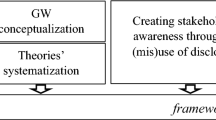Abstract
This article examines the question of whether it is ethical for company officials to use the force of government to reduce or eliminate foreign competition, using the antidumping laws as a case study. This article begins with a brief examination of the U.S. antidumping laws and then examines several ethical questions related to the antidumping laws. The main question to be addressed is whether, and under what circumstances, it is ethical for domestic producers to ask government to launch an antidumping investigation against a foreign competitor. Related questions to be examined include (1) Whether it is ethical to ask the government to launch an antidumping investigation even when the domestic company making the request knows that dumping has not occurred; (2) Whether it is ethical to ask for an antidumping investigation in cases where dumping (according to the definition of dumping) has occurred, where the effect is to help domestic producers at the expense of the general public. This article examines these questions by applying both utilitarian and non-utilitarian approaches.
Similar content being viewed by others
References
Armentano D. T.: 1990, Antitrust and Monopoly: Anatomy of a Policy Failure. Second edition. Holmes & Meier, New York & London
Armentano D. T.: 1999, Antitrust: The Case for Repeal. Revised Second edition. The Ludwig von Mises Institute, Auburn, AL
Bastiat F.: 1964a, Economic Harmonies. Foundation for Economic Education. Irvington-on-Hudson, NY
Bastiat F.: 1964b, Economic Sophisms. Foundation for Economic Education. Irvington-on-Hudson, NY
Bastiat F.: 1968, The Law. Foundation for Economic Education. Irvington-on-Hudson, NY
Bentham J.: 1988, The Principles of Morals and Legislation. Prometheus Books, Amherst, NY
Block W.: 1994, Total Repeal of Antitrust Legislation: A Critique of Bork, Brozen, and Posner, The Review of Austrian Economics 8(1), 35–70
Bovard J.: 1991, The Fair Trade Fraud. St. Martin’s Press, New York
Cameron May: 2006, The Global Anti-Dumping Handbook. Cameron May, London
Crisp, R. (ed.): 1997, Mill on Utilitarianism
Curtiss W. M.: 1953, The Tariff Idea. Foundation for Economic Education. Irvington-on-Hudson, NY
Dale R.: 1980, Anti-Dumping Law in a Liberal Trade Order. St. Martin’s Press, New York
Fisher F. M.: 1987, On Predation and Victimless Crime, Antitrust Bulletin 32, 85–92
Friedman M.: 1962, Capitalism & Freedom. University of Chicago Press, Chicago
Gallaway M. R., B. A. Blonigen, J. E. Flynn: 1999, Welfare Costs of the U.S. Antidumping and Countervailing Duty Laws, Journal of International Economics 49(2), 211–244
Goodin R. E.: 1995, Utilitarianism as a Public Philosophy. Cambridge University Press, New York
Hindley B., P. A. Messerlin: 1996, Antidumping Industrial Policy. The AEI Press, Washington, DC
Hospers J.: 1971, Libertarianism: A Political Philosophy for Tomorrow. Nash Publishing, Los Angeles
Hufbauer G. C., D. T. Berliner, K. A. Elliott: 1986, Trade Protection in the United States: 31 Case Studies. Institute for International Economics, Washington, DC
Knoll M. S.: 1987, United States Antidumping Law: The Case for Reconsideration. Texas International Law Journal 22, 265–290
Koller R. H.: 1971, The Myth of Predatory Pricing: An Empirical Study, Antitrust Law and Economics Review 4, 105–123
Lindsey B., D. J. Ikenson: 2003, Antidumping Exposed: The Devilish Details of Unfair Trade Law. Cato Institute, Washington, DC
Mastel G.: 1998, Antidumping Laws and the U.S. Economy. M.E. Sharpe, Armonk, NY
McGee J. S.: 1958, Predatory Price Cutting: The Standard Oil (N.J.) Case. Journal of Law and Economics 1, 137–169
McGee R. W.: 1993, The Case to Repeal the Antidumping Laws, Northwestern Journal of International Law & Business 13(3), 491–562
McGee R. W.: 1994, A Trade Policy for Free Societies: The Case against Protectionism. Quorum Books, Westport, CT & London
McGee R. W.: 1997, The Fatal Flaw in the Methodology of Law and Economics, Commentaries on Law and Economics 1, 209–223
Mill J. S.: 1993, On Liberty and Utilitarianism. Bantam Books, New York
Nozick R.: 1974, Anarchy, State and Utopia. Basic Books, New York
Palmeter N. D.: 1986, Torquemada and the Tariff Act: The Inquisitor Rides Again, International Lawyer 20, 641–657
Quinton A.: 1988, Utilitarian Ethics. Open Court, LaSalle, IL
Rand A.: 1964, The Virtue of Selfishness. Signet Books, New York
Ricardo, D.: 1817, Principles of Political Economy and Taxation
Rockefeller E. S.: 2007, The Antitrust Religion. Cato Institute, Washington, DC
Rothbard M. N.: 2004, Man, Economy, & State. Scholar’s Edition. Ludwig von Mises Institute, Auburn, AL
Rottenberg S. (Ed.). 1980, Occupational Licensure and Regulation. American Enterprise Institute, Washington, DC
Rowley C. K., R. D. Tollison, G. Tullock (eds). 1988, The Political Economy of Rent-Seeking. Kluwer Academic Publishers, Boston, Dordrecht & Lancaster
Schumpeter J. A.: 1942, Capitalism, Socialism and Democracy. Harper, New York
Shaw W. H.: 1999, Contemporary Ethics: Taking Account of Utilitarianism. Blackwell Publishers, Oxford
Shughart W. F. II: 1990, Antitrust Policy and Interest-Group Politics. Quorum Books, New York, Westport & London
Tullock G.: 1987, Private Wants, Public Means: An Economic Analysis of the Desirable Scope of Government. University Press of America, Lanham, New York & London
Tullock G.: 1989, The Economics of Special Privilege and Rent Seeking. Kluwer Academic Publishers, Boston, Dordrecht & London
Tullock G.: 1993, Rent Seeking. Edward Elgar Publishing Company, Brookfield, VT & Hants, UK
United States International Trade Commission: 1995, The Economic Effects of Antidumping and Countervailing Duty Orders and Suspension Agreements. Investigation No. 332–344, Publication 2900. Washington, DC: United States International Trade Commission, June
Author information
Authors and Affiliations
Corresponding author
Rights and permissions
About this article
Cite this article
McGee, R.W. Ethical Aspects of Using Government to Subvert Competition: Antidumping Laws as a Case Study of Rent Seeking Activity. J Bus Ethics 83, 759–771 (2008). https://doi.org/10.1007/s10551-008-9663-x
Received:
Accepted:
Published:
Issue Date:
DOI: https://doi.org/10.1007/s10551-008-9663-x




